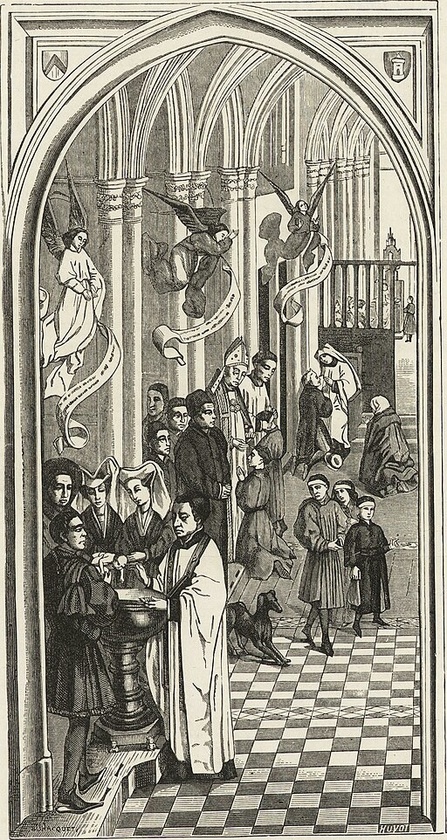Someone posted on FB asking how the many statements in Pope St. Gregory the Great decrying the idea of a universal bishop can be reconciled with the ecclesiology of Vatican 1 (1870). I responded by saying that Gregory's thoughts are not always consistent, and need some reconciling.
The following is a response to an Evangelical who said the following:
<<In fact, there is nothing definitive in the historical record that speaks to the regular baptism of babies until the middle of the 3rd century. >>
It is a bit painful to see this statement being made without further comment. Though there is doubt as to its origin being "Roman", many scholars would date the Apostolic Tradition, often attributed to Hippolytus of Rome, to the beginning of the 3rd century. I understand the recent scholarship on this (c.f. Bradshaw, Johnson, Phillips, et. al.), but it remains conventional to see this as an early 3rd century compilation. I think a good defense of it being both Roman and early 3rd century (and perhaps even prior) is given by Alistair Stewart, a leading scholar of Christian liturgical origins, in vol. 54 of the Popular Patristic Series put out by St. Vladimir's Seminary Press. I won't go into those arguments here, nor will I defend them. I would just add that the AT makes it pretty clear that children, including those who simply could not answer the questions being posed to them by the minister, were regularly brought forward for baptism.
Very influential in my own adoption of paedobaptism was precisely the fact made well by the late Lutheran Joachim Jeremias that Christian parents often did not have their little infants baptized until they knew that death was impending for them. What could possibly be the process of thought that would urge that kind of action? It is obvious that the parents did not wish their infant children to enter through the portal of death without the needed preparation for the kingdom of God to be revealed at the resurrection. And why would infants need that? Because they, too, are born "in sin"and without the grace, i.e., the equipment to be reconciled to God. And should they die without baptism, the only means through which man can attain to the citizenry of heaven, it would be a terrible fate to leave for your children. Otherwise, those infants baptized upon impending death would seem superfluous. That is why some of the quotations are worth "revisiting", and here's why.
In almost every instance, it is abundantly clear that the rationale for baptizing infants, i.e., to procure for them the remission of sins and citizenship in heaven, is incompatible with the theological understanding of the London Baptist Confession of Faith and the Westminster Confession of faith. In other words, whatever inequality one wishes to find about the baptismal policies of early Christian regions within the first 5 centuries of Church History and the later Medeival Catholic/Byzantine/Oriental traditions, none of the history gives any organic foundation for what Baptists or Presbyterians believe. In fact, whatever inequalities one might find, albeit with a magnifying glass, between ancient baptismal practices (and find them you will!), we can know for certain that the baptismal traditions of early Christianity offer no organic seeds for the 16th century elaborations on sacraments, faith, and the means of initiating salvation.
Origen gives the rationale pretty straightforwardly: "𝙀𝙫𝙚𝙧𝙮 𝙨𝙤𝙪𝙡 [infants, included]𝙩𝙝𝙖𝙩 𝙞𝙨 𝙗𝙤𝙧𝙣 𝙞𝙣𝙩𝙤 𝙛𝙡𝙚𝙨𝙝 𝙞𝙨 𝙨𝙤𝙞𝙡𝙚𝙙 𝙗𝙮 𝙩𝙝𝙚 𝙛𝙞𝙡𝙩𝙝 𝙤𝙛 𝙬𝙞𝙘𝙠𝙚𝙙𝙣𝙚𝙨𝙨 𝙖𝙣𝙙 𝙨𝙞𝙣 ... And if it should seem necessary to do, there may be added to the aforementioned considerations the fact that in the Church, 𝙗𝙖𝙥𝙩𝙞𝙨𝙢 𝙞𝙨 𝙜𝙞𝙫𝙚𝙣 𝙛𝙤𝙧 𝙩𝙝𝙚 𝙧𝙚𝙢𝙞𝙨𝙨𝙞𝙤𝙣 𝙤𝙛 𝙨𝙞𝙣𝙨; and according to the usage of the Church, baptism is given even to infants. 𝘼𝙣𝙙 𝙞𝙣𝙙𝙚𝙚𝙙 𝙞𝙛 𝙩𝙝𝙚𝙧𝙚 𝙬𝙚𝙧𝙚 𝙣𝙤𝙩𝙝𝙞𝙣𝙜 𝙞𝙣 𝙞𝙣𝙛𝙖𝙣𝙩𝙨 𝙬𝙝𝙞𝙘𝙝 𝙧𝙚𝙦𝙪𝙞𝙧𝙚𝙙 𝙖 𝙧𝙚𝙢𝙞𝙨𝙨𝙞𝙤𝙣 𝙤𝙛 𝙨𝙞𝙣𝙨 𝙖𝙣𝙙 𝙣𝙤𝙩𝙞𝙣𝙜 𝙞𝙣 𝙩𝙝𝙚𝙢 𝙥𝙚𝙧𝙩𝙞𝙣𝙚𝙣𝙩 𝙩𝙤 𝙛𝙤𝙧𝙜𝙞𝙫𝙚𝙣𝙚𝙨𝙨, 𝙩𝙝𝙚 𝙜𝙧𝙖𝙘𝙚 𝙤𝙛 𝙗𝙖𝙥𝙩𝙞𝙨𝙢 𝙬𝙤𝙪𝙡𝙙 𝙨𝙚𝙚𝙢 𝙨𝙪𝙥𝙚𝙧𝙛𝙡𝙪𝙤𝙪𝙨." (Homilies on Leviticus, 8.3)
The reasoning here is quite straightforward. All infants are born in sin. Baptism is given for the remission of sins. Therefore, baptize infants so that they are prepared for the passage into eternity.
Now, did Origen see this as a mere theological conclusion divorced from the consciousness of a tradition that was handed onward? He tells us:
"𝙏𝙝𝙚 𝘾𝙝𝙪𝙧𝙘𝙝 𝙧𝙚𝙘𝙚𝙞𝙫𝙚𝙙 𝙛𝙧𝙤𝙢 𝙩𝙝𝙚 𝘼𝙥𝙤𝙨𝙩𝙡𝙚𝙨 𝙩𝙝𝙚 𝙩𝙧𝙖𝙙𝙞𝙩𝙞𝙤𝙣 of giving Baptism even infants. For the Apostles, to whom were committed the secrets of divine mysteries knew that there is in everyone the innate stains of sin 𝙬𝙝𝙞𝙘𝙝 𝙢𝙪𝙨𝙩 𝙗𝙚 𝙬𝙖𝙨𝙝𝙚𝙙 𝙖𝙬𝙖𝙮 𝙩𝙝𝙧𝙤𝙪𝙜𝙝 𝙬𝙖𝙩𝙚𝙧 𝙖𝙣𝙙 𝙩𝙝𝙚 𝙎𝙥𝙞𝙧𝙞𝙩" (Commentary on Roman 5.9)
Tertullian, in the 3rd century, did speak against the baptizing of young children. But if we take a look at the context of his argument, we see that his rationale could only be born in a context where little children were baptized to his own knowledge. The context is the severity of the baptismal oath upon reception such that one should not haste to it. Delay is to be preferred. In fact, this is why many people in the early Church delayed their baptism until the end of life. Tertullian's logic against baptizing young children is the same logic against baptizing the unmarried! He thought the unmarried could be overcome by temptations in light of being single, and thus they could be prone to ruin their baptismal innocence. That is his issue with baptizing infants. He asks: "Why does the innocent period of life hasten to the remission of sins?" That assumes the effective regeneration of infants when baptized. It could very well be that Tertullian knew of the habit of the Church baptizing the unmarried and/or children, but discouraged it due to the experience of the high rate of failure in children or the unmarried in remaining pure.
In the letter to Fidus by Cyprian and his college of bishops, the rationale for baptizing newly born infants is for the purpose of dispensing God's grace: "As to what pertains to the case of infants; you said that they ought not to be baptized within the second or third day after their birth... In our council it seemed to us far otherwise. No one agreed to the course which you thought should be taken. Rather, 𝙬𝙚 𝙖𝙡𝙡 𝙟𝙪𝙙𝙜𝙚𝙙 𝙩𝙝𝙖𝙩 𝙩𝙝𝙚 𝙢𝙚𝙧𝙘𝙮 𝙖𝙣𝙙 𝙜𝙧𝙖𝙘𝙚 𝙤𝙛 𝙂𝙤𝙙 𝙤𝙪𝙜𝙝𝙩 𝙩𝙤 𝙗𝙚 𝙙𝙚𝙣𝙞𝙚𝙙 𝙩𝙤 𝙣𝙤 𝙢𝙖𝙣 𝙗𝙤𝙧𝙣." (Jurgens, Vol. 1, 585)
There you have it. Without baptism, infants are lacking the gifts afforded to them in baptism.
You mention that there were folks who were born into Christian homes who did not get baptized until adults. All this does, in my opinion, is show that credobaptism (and not to be confused with the soteriology of credobaptists today) was the norm in many early regions of Christianity. Nevertheless, that does not nudge them even a millimeter towards the theology of Baptists or Presbyterians. Here's how we know.
What would those Christians born in strong Christian homes but who were baptized adults say about baptism and infancy? I have a few handy from a quick grab from my 3 vole Jurgens set.
(1) St. Gregory of Nazianzus says the following in his Oration on Holy Baptism:
"Do you have an infant child? 𝘼𝙡𝙡𝙤𝙬 𝙨𝙞𝙣 𝙣𝙤 𝙤𝙥𝙥𝙤𝙧𝙩𝙪𝙣𝙞𝙩𝙮; rather, let the infant be sanctified from childhood. From his most tender age let him be consecrated by the Spirit. Do you fear the eal because of the weakness of nature? O what a pusillanimous mother, and of how little faith! Give your child the Trinity, that great and noble Protector... 'Well enough,' some will say, 'for those who ask for Baptism; but what do you have to say about those who are still children, and aware neither of loss nor of grace? Should we baptize them too?' 𝘾𝙚𝙧𝙩𝙖𝙞𝙣𝙡𝙮, 𝙞𝙛 𝙩𝙝𝙚𝙧𝙚 𝙞𝙨 𝙖𝙣𝙮 𝙥𝙧𝙚𝙨𝙨𝙞𝙣𝙜 𝙙𝙖𝙣𝙜𝙚𝙧. 𝙗𝙚𝙩𝙩𝙚𝙧 𝙩𝙝𝙖𝙩 𝙩𝙝𝙚𝙮 𝙗𝙚 𝙨𝙖𝙣𝙘𝙩𝙞𝙛𝙞𝙚𝙙 𝙪𝙣𝙖𝙬𝙖𝙧𝙚 𝙩𝙝𝙚𝙣 𝙩𝙝𝙚𝙮 𝙙𝙚𝙥𝙖𝙧𝙩 𝙪𝙣𝙨𝙚𝙖𝙡𝙚𝙙 𝙖𝙣𝙙 𝙪𝙣𝙞𝙣𝙞𝙩𝙞𝙖𝙩𝙚𝙙." (40.17 & 28; Jurgens, Vol. 2, 1011/1012a)
Here, the Cappadocian (in whose region adult baptism was probably the more repetitive practice) shows that baptism might be restricted to infants who are in danger of death. Very well. But look also to what else he implies. If any infant were to pass from this life without baptism, they are unsealed and unitiated. And to what does this result? He doesn't say but he clearly warns. What this means is that a man who himself was born in a Christian home but who received baptism in adulthood was showing that such a practice was common but equally so that if parents should not baptize their infants they should prepare to face the consequences of such a risk! That is hardly a Baptist or Presbyterian context.
St. Ambrose writes: "Unless a man be born again of water and the Holy Spirit, he cannot enter the kingdom of God.' No one is excepted: not the infant, not the one prevented by some necessity." (Abraham 2.11.84; jurgens, vol. 2, 1324)
St. John Chrysostom: "You see how many are the benefits of Baptism, and some think its heavenly grace consists only in the remission of sins; but we have enumerated ten honors. For this reason we baptize infants, though they are not deiled by sin [lege: though they do not have sins]; so that there may be given to them holiness, righteousness, adoption, inheritance, brotherhood with Christ, and that they may be His members." (Baptismal Catechesis, 2.4; Jurdens, Vol. 2, 1145a).

Abraham's belief in God's promise is a God-pleasing virtue that includes, therefore, a formation of charity and hope towards God. It constitutes a faith that, for the ungodly, is a repentant faith. For the saint, a firm commitment to persevere with God's plan over and against falling to the temptation to go one's own way. Therefore, the faith of Abraham does indeed serve to be an interior sanctity that God recognizes as the "obedience of faith". Nevertheless, God credits more to Abraham than what his faith gives to God. We have to keep in mind that St. Paul sees in the justification act upon Abraham the justification of a man who is, whatever else might be said that was praiseworthy up to this point (Rom. 4:18-22), ungodly. Therefore, in the imputation of Abraham's faith as righteousness, something of a merciful grace is being applied. He is not just recognizing the value of Abraham's faith as meriting justification, i.e., the remission of sins and the sanctifying renewal of the interior ...

"For you said excellently and rightly that these teachers are not opposed to each other, just as Paul and James are not, with one saying that a human being is justified by faith without works [Gal. 2:16, Eph. 2:8-9], while the other writes that faith without works is dead [Jas. 2:26]. For Paul spoke of the faith that precedes baptism, which requires only the consent of the whole heart to the confession, without its being preceded by a life of good works, a faith that justifies all that partake in some way of evil, when in the divine laver of regeneration he confesses his faith that comes from instruction. James, on the other hand, speaks of the faith that follows baptism, that it is dead if one possesses it without works, that is, if one does not confirm it by deeds of justice. For baptism is the pledge of a life ordered to the good... But we can easily draw a solution form the divine scriptures. For it is the one Abraham who at distinct times is the image, now of one faith, now of the other, of...














